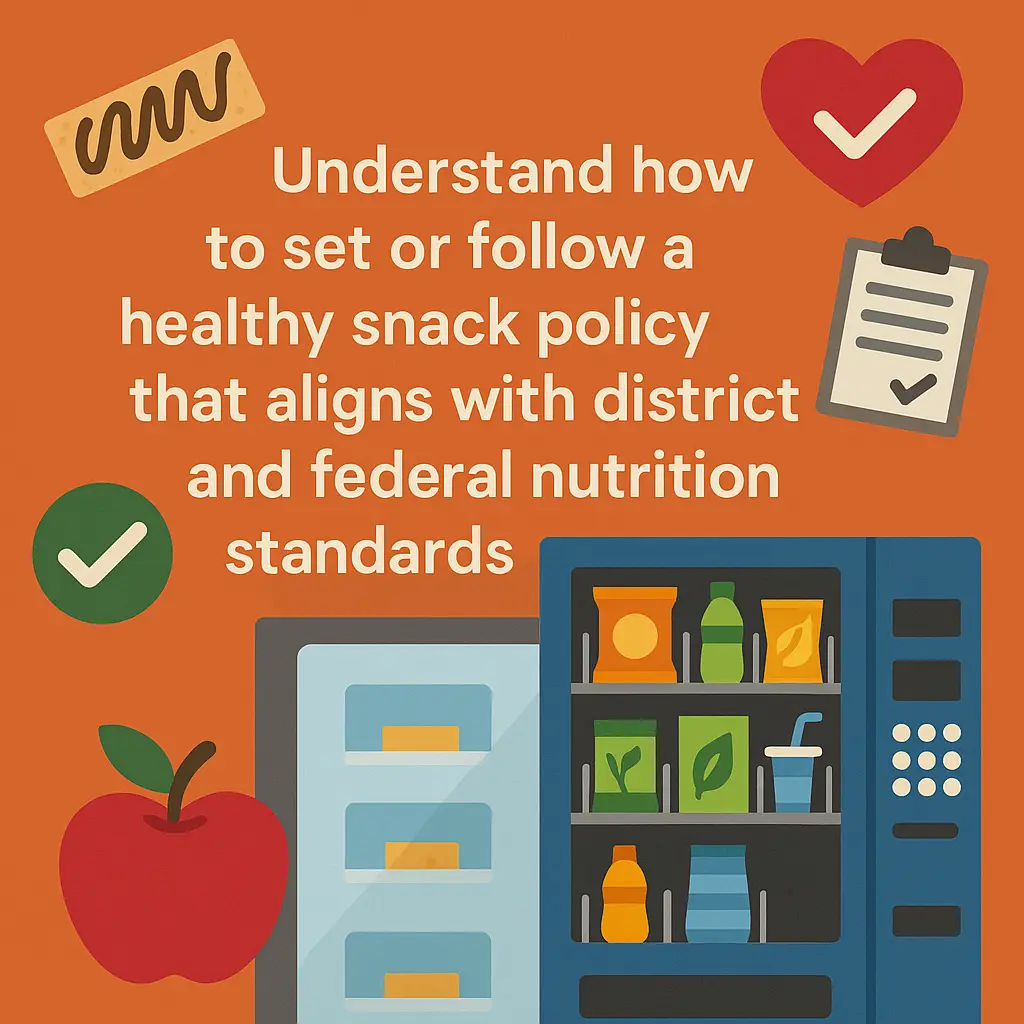Healthy Snack Policy for Schools
Understand how to set or follow a healthy snack policy that aligns with district and federal nutrition standards.
Back to Vending for Schools ResourcesUnderstand how to set or follow a healthy snack policy that aligns with district and federal nutrition standards.
Back to Vending for Schools ResourcesAny school snack policy should align with USDA Smart Snacks standards, which regulate calories, sugar, sodium, and fat content. These rules apply to snacks sold during school hours via vending, cafeteria à la carte, and fundraising. Healthy policies improve student well-being and prevent regulatory issues.
![]() Healthy snack policies help reduce childhood obesity rates in schools
Healthy snack policies help reduce childhood obesity rates in schools
![]() Federal Smart Snacks standards apply to vending and school stores
Federal Smart Snacks standards apply to vending and school stores
![]() Clear policies improve vendor compliance and accountability
Clear policies improve vendor compliance and accountability

Schools play a large role in shaping student health. A clear, well-structured healthy snack policy ensures that food and beverages provided on campus comply with USDA standards and help foster long-term well-being. The USDA’s Smart Snacks in School standards are the baseline for most districts. These cover nutritional elements like calories, sodium, fat, and sugar content, and apply to vending machines, school stores, and à la carte lines during the school day.
To start implementing a compliant snack policy, schools often form wellness committees that include administrators, food service personnel, parents, and health professionals. These teams evaluate current offerings, assess gaps, and guide both policy creation and updates. Common steps include reviewing vendor contracts, listing allowable items, and publishing clear guidelines outlining what can and cannot be sold.
One of the biggest challenges is vending compliance. Machines installed by third-party vendors must offer products that meet nutrition guidelines without sacrificing appeal. Items like low-calorie granola bars, unsweetened dried fruit, water, and low-sugar drinks are popular alternatives. Managed vending services can make it easier by curating compliant product selections and ensuring stock remains fresh and consistent.
Another key consideration is education. Students, staff, and parents should understand why changes are made. Signage in vending areas, classroom discussions, and parent newsletters can reinforce a positive and supportive food culture.
Well-written policies also improve vendor accountability. Requiring regular inventory checks, approval for new SKUs, and vendor performance reviews helps guarantee students get snacks that meet both health and quality standards.
Looking for inspiration on healthy vending options? Read our tips in this guide to machine product ideas or explore how complementary beverage services can support wellness on campus in this resource on office coffee station supplies.
If you're exploring vending options for your business, Vending Exchange can help simplify the process. Delivery, Installation and Equipment is provided at no cost to you - vendors provide the machines, keep them stocked, and handle all servicing. Whether you need a provider or full-service management, just fill out the form on this page to get started.
Smart Snacks are USDA nutrition guidelines that regulate snacks sold in schools. They set limits on sugar, fat, sodium, and calories to promote student health.
Yes, vending machines operating during the school day must comply with federal and district-approved healthy snack guidelines such as the Smart Snacks rules.
Use the USDA’s Smart Snacks Product Calculator or consult nutritional information to check if a snack meets the criteria for calories, saturated fat, sugar, and sodium.
School administrators, food service directors, and wellness policy teams typically ensure vending and cafeteria selections follow guidance. They may regularly audit compliance.
Yes, there are many tasty snacks that meet USDA standards—like whole grain crackers, unsweetened fruit snacks, and baked chips. Variety and student-friendly branding go a long way.
Yes, beverage offerings are regulated by grade level. Options often include water, low-fat milk, and 100% fruit or vegetable juice in filtered portion sizes.
Start by forming or consulting a wellness committee, reviewing federal and state guidelines, and drafting clear internal protocols for all food and beverage access points.
If a vendor fails to comply, schools may need to revise contracts or switch providers. Work with vendors that specialize in Smart Snacks-compliant offerings.
Yes, shelf-stable, portion-controlled meals and snack kits that meet USDA guidelines can support students staying after hours or for extended programs.
Most during-school fundraisers must meet Smart Snacks standards. However, exceptions may apply if held after school hours or as part of approved annual exemptions.